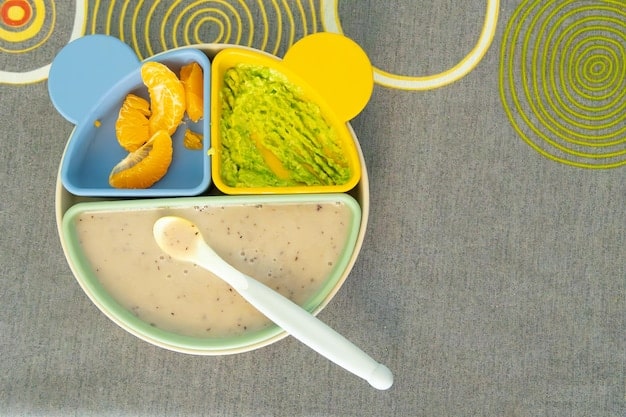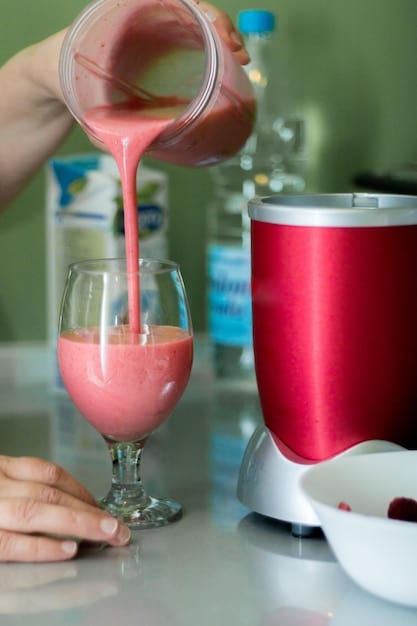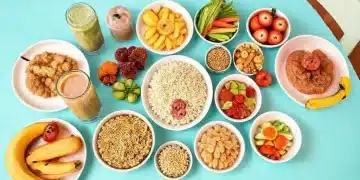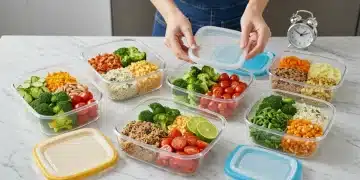Toddler Meal Prep: 3 Quick & Easy Breakfast Ideas for a Stress-Free Morning

Toddler meal prep for breakfast can transform hectic mornings, offering nutritious and time-saving solutions with options like overnight oats, fruit and veggie smoothies, and mini frittatas, ensuring your little one starts the day with a healthy and delicious meal.
Navigating toddlerhood comes with its own set of unique challenges, and mornings can often feel like a chaotic race against the clock. One of the biggest struggles for parents is ensuring their little ones get a nutritious and satisfying breakfast amidst the morning rush. That’s where toddler meal prep: 3 quick & easy breakfast ideas for a stress-free morning routine comes to the rescue, which can be a game-changer, providing time-saving solutions that don’t compromise on health.
Why Toddler Meal Prep is a Game-Changer
Toddler meal prep is more than just a trend; it’s a strategy for sanity. By dedicating a bit of time to prepare meals in advance, parents can reclaim their mornings and reduce stress levels. This approach not only saves time but also ensures that toddlers are eating nutritious, balanced meals even on the busiest days.
The Benefits of Planning Ahead
Planning your toddler’s meals ahead of time offers a multitude of benefits. It eliminates the last-minute scramble for breakfast options, reduces the likelihood of resorting to unhealthy convenience foods, and allows for better control over the ingredients your child consumes.
Time-Saving Tips for Busy Parents
Effective meal prep doesn’t have to be an all-day affair. Simple strategies like dedicating a couple of hours on the weekend or prepping ingredients the night before can make a significant difference. Focus on recipes that are quick, easy, and can be made in large batches.
- Choose recipes with minimal ingredients.
- Use pre-chopped fruits and vegetables when possible.
- Involve your toddler in the process to make it a fun activity.
- Store meals in airtight containers for freshness.
Toddler meal prep empowers parents to take control of their mornings, ensuring that breakfast is a stress-free and nutritious experience for both themselves and their little ones. With a little planning and the right recipes, it’s possible to start the day on a positive note.

Overnight Oats: A Nutritious and Convenient Start
Overnight oats are a fantastic option for toddler meal prep because they require no cooking and can be customized with a variety of ingredients to suit your child’s preferences. This breakfast is packed with fiber, protein, and essential nutrients, making it a healthy and satisfying choice.
Basic Recipe for Toddler-Friendly Overnight Oats
Creating overnight oats is incredibly simple. Start with a base of rolled oats, milk (dairy or non-dairy), and yogurt. Add a touch of sweetness with a drizzle of honey or maple syrup, and then incorporate your toddler’s favorite fruits and toppings.
Tips for Customizing and Storing
The beauty of overnight oats lies in its versatility. Experiment with different flavor combinations to keep things interesting. Berries, bananas, applesauce, and nut butter are all great additions. Store individual portions in jars or containers in the refrigerator for up to five days.
- Use full-fat yogurt for added richness and calcium.
- Soak oats in milk overnight for a creamy texture.
- Add chia seeds for extra fiber and omega-3 fatty acids.
- Adjust the sweetness based on your toddler’s preference.
Overnight oats are not only nutritious and convenient but also a blank canvas for creativity. By customizing the ingredients to your toddler’s taste, you can ensure they start their day with a breakfast they love while enjoying all the health benefits of this wholesome meal.
Fruit and Veggie Smoothies: A Nutritional Powerhouse
Smoothies are an excellent way to pack a variety of fruits and vegetables into one convenient and delicious breakfast. For toddlers, smoothies can be especially appealing due to their smooth texture and naturally sweet flavor. They’re also customizable, allowing you to sneak in extra nutrients without your little one even noticing.
Simple Smoothie Recipes for Picky Eaters
When creating smoothies for picky eaters, start with a base of fruits they already enjoy, such as bananas, berries, or mangoes. Then, gradually introduce vegetables like spinach, kale, or avocado in small amounts. The sweet fruits will help mask the taste of the veggies, making it easier for your toddler to accept them.
Tips for Making Ahead and Freezing
Smoothies can be easily prepared in advance and stored in the refrigerator for up to 24 hours. For longer storage, consider freezing individual portions in freezer-safe bags or containers. When ready to serve, simply thaw the smoothie for a few minutes and blend until smooth.
- Use frozen fruits for a thicker, colder smoothie.
- Add protein powder or Greek yogurt for extra protein.
- Include healthy fats like avocado or flax seeds for added nutrition.
- Divide smoothies into reusable pouches for easy serving.

Fruit and veggie smoothies are a versatile and nutritious breakfast option for toddlers. They provide a convenient way to ensure your child gets a daily dose of vitamins, minerals, and antioxidants, all while enjoying a delicious and refreshing meal.
Mini Frittatas: Protein-Packed and Portable
Mini frittatas are a fantastic breakfast option for toddlers because they are packed with protein, easy to eat, and perfectly portioned. These little egg cups can be customized with a variety of vegetables, cheeses, and meats, making them a versatile and nutritious choice for even the pickiest eaters.
Easy Recipes for Toddler-Sized Frittatas
Creating mini frittatas is a simple process. Whisk together eggs with a splash of milk or cream, and then add your toddler’s favorite ingredients, such as chopped vegetables, shredded cheese, or cooked meats. Pour the mixture into muffin tins and bake until set.
Storage and Reheating Tips
Mini frittatas can be stored in the refrigerator for up to four days or frozen for longer storage. To reheat, simply microwave them for a few seconds or warm them in the oven until heated through. They are perfect for on-the-go breakfasts or as part of a packed lunch.
- Use silicone muffin liners for easy removal.
- Pre-cook vegetables to ensure they are tender.
- Add a sprinkle of cheese for extra flavor and calcium.
- Involve your toddler in choosing their favorite ingredients.
Mini frittatas are a protein-packed and portable breakfast option that can be tailored to your toddler’s preferences. By preparing a batch ahead of time, you can ensure that your little one has a nutritious and satisfying start to their day, no matter how busy the morning may be.
Adapting Recipes for Dietary Needs & Allergies
One of the greatest aspects of meal prepping toddler breakfasts is the ability to adapt recipes to suit various dietary needs and allergies. Whether your child has a dairy intolerance, gluten sensitivity, or other dietary restrictions, there are always ways to modify the recipes to ensure they can still enjoy a nutritious and delicious breakfast.
Dairy-Free Adaptations
For toddlers with dairy sensitivities, substituting dairy milk with plant-based alternatives like almond, soy, or oat milk is a straightforward solution. Yogurt can be replaced with coconut or almond yogurt, and cheese can be omitted or replaced with dairy-free cheese alternatives.
Gluten-Free Adaptations
Gluten-free adaptations are also manageable. Traditional oats can be substituted with certified gluten-free oats. For frittatas, ensure that any added ingredients are also gluten-free. The key is to always read labels carefully to avoid cross-contamination.
Nut-Free Considerations
When it comes to nut allergies, avoid using any nut-based products like almond milk or nut butter. Sunflower seed butter is an excellent alternative to peanut butter, providing a similar creamy texture and nutritional value.
- Always double-check ingredient labels for allergens.
- Consider using alternatives like chia seeds or flaxseeds for added nutrients.
- Be mindful of potential cross-contamination when preparing meals.
- Consult with a pediatrician or nutritionist for specific dietary concerns.
Toddler meal prep can be inclusive of every child’s needs by carefully adapting recipes to accommodate dietary restrictions and allergies. With thoughtful substitutions and attention to detail, you can ensure that every toddler enjoys a safe, healthy, and delicious breakfast.
Making Meal Prep a Family Affair
Involving your toddler in the meal prep process can turn a chore into a fun and educational activity. Not only does it teach them about healthy eating habits, but it also fosters a sense of independence and responsibility. Even young toddlers can participate in simple tasks, making meal prep a family affair that promotes bonding and learning.
Age-Appropriate Tasks for Toddlers
Assign age-appropriate tasks to your toddler to keep them engaged. Younger children can help wash fruits and vegetables, while older toddlers can assist with measuring ingredients or stirring mixtures. Make sure to provide supervision to ensure their safety.
Creating a Positive Mealtime Environment
Building a positive mealtime environment is essential for encouraging healthy eating habits. Make meal prep and mealtime enjoyable experiences by offering praise and encouragement, avoiding pressure to eat, and focusing on the positive aspects of food.
- Let your toddler choose their favorite ingredients.
- Provide child-sized cooking tools for easier handling.
- Turn on some music to make meal prep more fun.
- Celebrate their efforts with positive reinforcement.
Toddler meal prep goes beyond just preparing meals; it’s about creating opportunities for learning, bonding, and fostering healthy habits. By involving your toddler in the process and creating a positive mealtime environment, you can instill a lifelong appreciation for nutritious food.
Troubleshooting Common Meal Prep Challenges
Even with the best intentions, meal prepping for toddlers can sometimes present challenges. Dealing with picky eaters, managing time effectively, and ensuring food safety are common concerns. However, with the right strategies, these challenges can be overcome, making meal prep a sustainable and enjoyable part of your routine.
Dealing with Picky Eaters
Picky eating is a common phase in toddlerhood. Offer a variety of options and allow your child to choose what they want to eat. Avoid forcing them to eat foods they dislike, as this can create negative associations. Instead, focus on introducing new foods gradually and pairing them with familiar favorites.
Time Management Strategies
Effective time management is crucial for successful meal prep. Plan your meals in advance, create a shopping list, and dedicate specific blocks of time for prepping. Use kitchen gadgets like food processors and blenders to speed up the process.
Ensuring Food Safety
Food safety should always be a top priority when prepping meals for toddlers. Wash your hands thoroughly before preparing food, use clean cutting boards and utensils, and store meals properly in airtight containers. Follow guidelines for safe storage and reheating to prevent foodborne illnesses.
- Introduce new foods gradually to identify potential allergens.
- Keep a journal of your toddler’s favorite meals and ingredients.
- Prepare extra portions to freeze for future use.
- Consult with a pediatrician or nutritionist for personalized advice.
Toddler meal prep can be a rewarding experience, even with its challenges. By addressing common concerns and implementing practical strategies, you can create a meal prep routine that is efficient, enjoyable, and beneficial for your family.
| Key Point | Brief Description |
|---|---|
| ⏰ Save Time | Prepare meals in advance to reduce morning stress. |
| 🍎 Nutritious Meals | Ensure balanced diets with pre-planned, healthy options. |
| 🧺 Easy Cleanup | Reduce mess and cleaning time on busy mornings. |
| ✅ Customizable | Adapt recipes to suit specific dietary needs and preferences. |
Frequently Asked Questions
▼
Most toddler breakfast options, like overnight oats and mini frittatas, can be prepped up to 4-5 days in advance if stored properly in the refrigerator. Smoothies are best consumed within 24 hours or frozen for longer storage.
▼
Opt for BPA-free, airtight containers to keep meals fresh and prevent leaks. Glass containers are also a good option. For smoothies, reusable pouches or sippy cups work well.
▼
Involve your toddler by letting them help wash fruits, measure ingredients, or decorate containers. Play music and create a positive, engaging atmosphere to make the process enjoyable.
▼
Offer a variety of options and let your toddler choose what they want. Avoid forcing them to eat, as this can create negative associations. Try introducing new foods gradually alongside familiar favorites.
▼
Yes, freezing is a great way to extend the shelf life of toddler meals. Ensure meals are properly cooled before freezing, and store them in freezer-safe containers or bags. Thaw in the refrigerator before reheating.
Conclusion
By embracing toddler meal prep with these quick and easy breakfast ideas, you can transform your mornings from chaotic to calm, ensuring your little one starts the day with a nutritious and delicious meal. With a bit of planning and creativity, you’ll not only save time but also foster healthy eating habits that will benefit your child for years to come.





